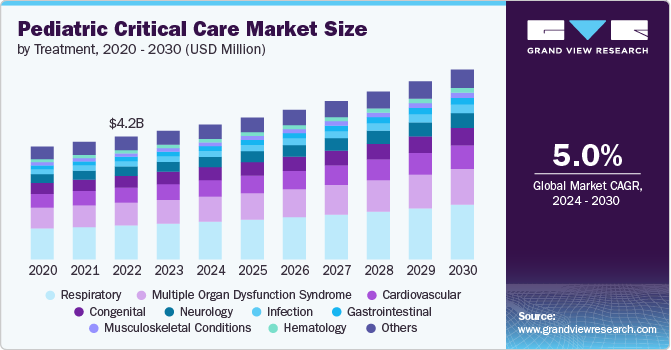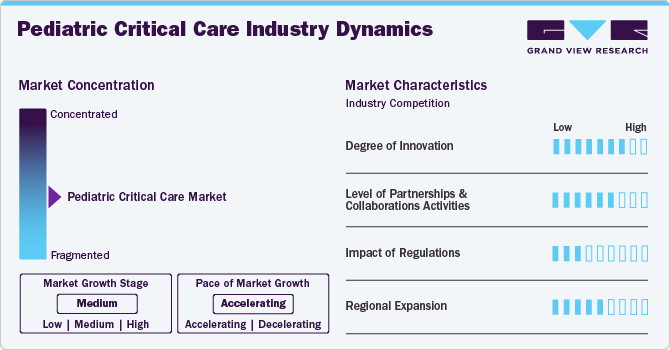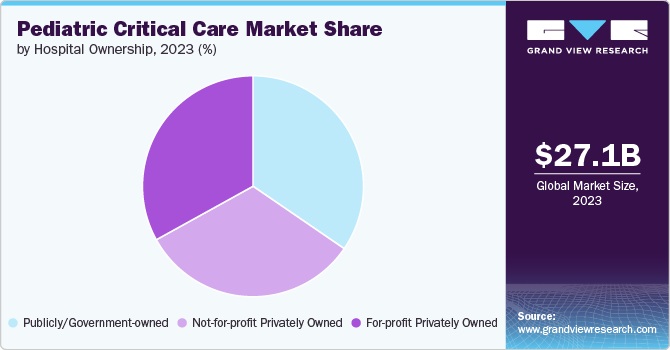- Home
- »
- Medical Devices
- »
-
Pediatric Critical Care Market Size And Share Report, 2030GVR Report cover
![Pediatric Critical Care Market Size, Share, & Trends Report]()
Pediatric Critical Care Market (2024 - 2030) Size, Share, & Trends Analysis Report By Treatment (Respiratory, Cardiovascular, Neurology, Gastrointestinal), By Hospital Ownership, By Region, And Segment Forecasts
- Report ID: GVR-4-68040-400-6
- Number of Report Pages: 145
- Format: PDF
- Historical Range: 2018 - 2023
- Forecast Period: 2024 - 2030
- Industry: Healthcare
- Report Summary
- Table of Contents
- Segmentation
- Methodology
- Download FREE Sample
-
Download Sample Report
Pediatric Critical Care Market Size & Trends
The global pediatric critical care market size was estimated at USD 27.13 billion in 2023 and is expected to grow at a CAGR of 5.87% during the forecast period. The demand for pediatric critical care is expected to grow in response to the increasing prevalence of complex medical conditions in children. Advances in medical technology and treatment options are allowing more critically ill children to survive, creating a greater need for specialized care. To meet this demand, hospitals are expanding and enhancing their pediatric ICU services to provide the highest level of care for pediatric patients.

The rising incidence of respiratory infections among children is expected to drive the growth of the market. According to the World Health Organization (WHO), respiratory infections are a leading cause of admissions to PICUs globally. In a study by the Korean Society of Critical Care Medicine in November 2022, found that respiratory failure 30.3%, sepsis 14.1%, cardiac arrest 11.4%, heart disease 9.8%, and neurological conditions 5.9% were among the primary reasons for PICU admissions in children.
The rise in premature births, chronic health conditions, and complex medical needs among children contribute to the increased demand for pediatric critical care services. For instance, according to the National Library of Medicine published article in the U.S., the overall percentage of pediatric hospital admissions involving ICU care has increased from 10.6% in 2001 to 15.5% in 2019. Similarly, the percentage of ICU admissions in children’s hospitals increased significantly from 51.2% to 85.1% during the same period. This trend indicates a regionalization of pediatric critical care, with more children receiving specialized care in dedicated pediatric facilities rather than general hospitals. The prevalence of ICU care among hospitalized children increased significantly, indicating that approximately 239,000 children were admitted to a U.S. ICU in 2019.
Furthermore, according to the article published by the International Journal of Contemporary Pediatrics in 2021, highlighted that South Asia has the highest rates of low-birth-weight infants globally, with over half being born in Asia. In addition, the World Health Organization's data from May 2023 indicated that an estimated 13.4 million babies are born prematurely in 2020, accounting for over 10% of all births worldwide. As a result of these trends, there is a rising need for pediatric intensive care services.
Market Concentration & Characteristics
The chart below illustrates the relationship between market concentration, industry characteristics, and industry participants. The x-axis represents the level of industry concentration, ranging from low to high. The y-axis represents various industry characteristics, including industry competition, degree of innovation, level of mergers & acquisitions activities, impact of regulations, and geographic expansion. The degree of innovation is high, and the level of partnerships & collaborations activities is high. The impact of regulations on the market is moderate, and the regional expansion of the market is moderate.
The significant innovation in pediatric intensive care units is expected to have a major impact on the pediatric critical care market. With programs such as the IGNITE PICU innovation program at the Lefkofsky Pediatric Intensive Care Unit, new diagnostic and treatment approaches are being developed to improve outcomes for critically ill children. The incorporation of virtual reality technology is revolutionizing the patient experience, providing immersive and interactive environments to promote emotional and cognitive well-being.
The impact of partnership & collaborations on the market is high due to several key market players, are involved in partnership & collaborations activities to expand their market presence. For instance, John Muir Health and Stanford Medicine Children's Health collaborated to offer specialized pediatric services in Contra Costa County and nearby areas. In March 2022, the partnership, extended until 2032, enhances pediatric and neonatal care access in the East Bay. This collaboration ensures local high-quality care and easy access to a top-ranked children's hospital for advanced care.

The impact of regulations on the pediatric critical care market is significant, influencing various aspects such as the social determinants of health (SDoH), healthcare policy, and economic considerations. Regulatory bodies, such as the American Board of Pediatrics, oversee the accreditation of pediatric critical care medicine (PCCM) training programs. These regulations dictate the number and distribution of training programs, which in turn affects the supply of qualified pediatric intensivists.
Regional expansion plays a significant role in the pediatric critical care market, influencing both capacity and service delivery in response to growing healthcare demands. in June 2022, Ericsson and Save the Children, a well-known child rights organization, have come together to set up state-of-the-art Pediatric Intensive Care Units (PICU) in government hospitals in five Indian cities. This collaboration is focused on meeting the critical healthcare requirements of children aged 0-12 years, underscoring the significance of teamwork in improving pediatric healthcare and influencing the development of the pediatric critical care sector.
Treatment Insights
Based on the treatment, the respiratory segment is accounted for largest revenue share of over 27% in 2023. The rising prevalence of respiratory issues such as acute respiratory distress syndrome (ARDS) and severe asthma exacerbations has been a major issue for ICU admissions among children. The PICANet State of the Nation Report for 2023 reveals a significant and consistent increase in admissions with respiratory primary diagnoses over a three-year period. In 2022, respiratory admissions made up over 30% of all PICU activity, showcasing a continuous growth trend from 2020 to 2022. This trend underscores the growing importance of respiratory care in pediatric critical care services.
However, Cardiovascular segment is accounted of substantial growth during the forecast period. Increasing rates of pediatric heart surgeries, are leading to the establishment of specialized pediatric cardiac intensive care units (CICUs) to cater to complex cases. This trend is supported by a rising prevalence of congenital heart diseases among children, necessitating enhanced critical care services. In addition, the integration of advanced technologies in cardiac monitoring and treatment is further propelling market expansion.
Hospital Ownership Insights
Based on hospital ownership, Public/government hospitals segment accounted for the largest revenue share of over 34% in 2023. Public/government hospitals are observed to have the largest number of patient beds and cater to numerous service areas/medical conditions via their specialized departments. Public hospitals offer specialized services and advanced technologies, making them central to pediatric healthcare. In addition, government initiatives aimed at improving access to healthcare and reducing healthcare disparities are boosting the demand for PICU services.

For-profit privately owned are projected to witness the fastest CAGR over the forecast period, owing to rising demand for specialized pediatric services, enhanced technological investments, and favorable reimbursement policies. In addition, the flexibility of for-profit institutions allows for rapid adaptation to evolving healthcare needs, further driving market growth through improved patient care and operational efficiencies.
Regional Insights
Asia Pacific Pediatric Critical Care Market Trends
Asia Pacific pediatric critical care market held the largest market share of over 53% in 2023 and witness the fastest growth during the forecast period. In countries such as India and China, the ICU admission rates for pediatric patients are rising due to increased healthcare access and awareness of pediatric health issues. According to UNICEF data, the neonatal mortality rate in South Asia was 22.992 per 1,000 live births in 2021, resulting in 801,694 neonatal deaths in the region that year. The large number of patients, rising awareness about neonatal care, and the increasing presence of global companies are expected to drive market growth in the coming years.
Japan pediatric critical care market is expected to grow significantly over the forecast period, driven by technological advancements, rising awareness of pediatric diseases, and increased government support. This growth is also fueled by the need for specialized care for children with chronic illnesses and the rising prevalence of pediatric diseases such as ADHD and ASD.
The pediatric critical care market in India is expected to witness the fastest growth during the forecast period. This is attributed due to the establishment of more pediatric intensive care units (PICUs) and training programs for healthcare professionals enhances service delivery. In addition, the prevalence of chronic conditions such as congenital heart diseases and respiratory issues fuels demand for specialized care, ensuring a robust market expansion in the coming years.
North America Pediatric Critical Care Market Trends
North America pediatric critical care market is expected to grow significantly during the forecast period, driven by increasing pediatric illness cases, advancements in medical technology, and rising healthcare expenditures. Factors such as a surge in respiratory illnesses and congenital disorders among children are further propelling demand for specialized care. This trend is expected to enhance the capacity and capabilities of PICUs across the region.
U.S. pediatric critical care market is anticipated to grow significantly over the forecast period, driven by the rising number of admissions to specialized pediatric ICUs (PICUs) in major children's hospitals.
Europe Pediatric Critical Care Market Trends
Europe pediatric critical care market is anticipated to grow significantly over the forecast period. Countries such as the UK and Germany have robust pediatric healthcare systems, leading to higher ICU admission rates. The availability of specialized pediatric facilities contributes to better access to critical care.
The pediatric critical care market in the UK is expected to grow significantly over the forecast period, driven by a 5% annual increase in demand for specialized services. With approximately 16,500 critically ill children admitted to Pediatric Intensive Care Units (PICUs) annually, and 8-10% requiring high dependency care, the growing need for intensive pediatric services highlights the urgent need for enhanced facilities and resources in this sector.
Germany pediatric critical care market is expected to grow significantly over the forecast period, fueled by an increasing number of pediatric admissions. This surge in demand is attributed to factors such as rising chronic illnesses and premature births.
Latin America Pediatric Critical Care Market Trends
Latin America pediatric critical care market is anticipated to grow significantly over the forecast period. This surge is driven by factors such as rising birth rates, increased prevalence of chronic diseases, and growing awareness of specialized pediatric care. Investments in healthcare infrastructure and rising disposable incomes are further propelling the market forward.
Brazil pediatric critical care market is expected to grow significantly over the forecast period. A study conducted in a tertiary hospital in Porto Alegre, Brazil, highlighted that pediatric ICU admissions are significant, with observed mortality rates higher for patients admitted from wards compared to those coming from emergency departments.
MEA Pediatric Critical Care Market Trends
The MEA pediatric critical care market is experiencing robust growth, driven by increasing healthcare investments and rising awareness of pediatric health issues. The market is projected to expand significantly due to advancements in medical technology, a growing pediatric population, and the rising incidence of chronic conditions among children.
The pediatric critical care market in South Africa is expanding significantly, driven by increased healthcare investments and a rising pediatric population. Enhanced medical technologies and a growing focus on specialized care for critically ill children are further propelling this growth.
Key Pediatric Critical Care Company Insights
The market is fragmented, with the presence of many country-level players. The key participants in the market are divided into various strategic initiatives to expand their business footprint and gain a competitive edge in the global market.
Key Pediatric Critical Care Companies:
The following are the leading companies in the pediatric critical care market. These companies collectively hold the largest market share and dictate industry trends.
- Birmingham Women's and Children's
- The Children's Hospital of Philadelphia
- Memorial Sloan Kettering Cancer Center
- Great Ormond Street Hospital
- The Hospital for Sick Children
- Weill Cornell Medicine
- Boston Children's Hospital
- John Muir Health
- Alder Hey Children's NHS Foundation Trust.
- Ann & Robert H. Lurie Children's Hospital of Chicago
Recent Developments
-
In February 2024, in February 2024, UCSF Health and John Muir Health opened a new cancer center in Walnut Creek. This partnership demonstrates their strong commitment to providing excellent care and expanding access for pediatric patients in the region.
-
In October 2023, Aston University and Birmingham Women’s and Children’s NHS Foundation Trust formed a collaboration to explore the use of technology, big data, and AI in healthcare. The partnership will focus on how these advanced technologies can bring transformative changes to pediatric and women’s healthcare, as well as the mental health sector for young people.
-
In July 2021, Boston Children's Hospital and Cape Cod Hospital formed a partnership to enhance patient access to specialized pediatric care for Cape Cod families. Through this partnership, doctors from Boston Children’s offer 24/7 medical services and consultations for Cape Cod Hospital’s pediatric program, including support for the inpatient unit, newborn nursery, labor and delivery unit, and emergency department.
Pediatric Critical Care Market Report Scope
Report Attribute
Details
Market size value in 2024
USD 28.46 billion
Revenue forecast in 2030
USD 40.07 billion
Growth rate
CAGR of 5.87% from 2024 to 2030
Actual data
2018 - 2023
Forecast period
2024 - 2030
Quantitative units
Revenue in USD million/billion and CAGR from 2024 to 2030
Report coverage
Revenue forecast, company ranking, competitive landscape, growth factors, and trends
Segments covered
Treatment, hospital ownership, region
Regional scope
North America; Europe; Asia Pacific; Latin America; MEA
Country scope
U.S.; Canada; Mexico; Germany; UK; France; Italy; Spain; Norway; Denmark; Sweden; China; Japan; India; South Korea; Australia; Thailand; Brazil; Argentina; Saudi Arabia; South Africa; UAE; and Kuwait
Key companies profiled
Birmingham Women's and Children's; The Children's Hospital of Philadelphia; Memorial Sloan Kettering Cancer Center; Great Ormond Street Hospital; The Hospital for Sick Children; Weill Cornell Medicine; Boston Children's Hospital; John Muir Health; Alder Hey Children's NHS Foundation Trust; Ann & Robert H. Lurie Children's Hospital of Chicago
Customization scope
Free report customization (equivalent up to 8 analysts working days) with purchase. Addition or alteration to country, regional & segment scope.
Pricing and purchase options
Avail customized purchase options to meet your exact research needs. Explore purchase options
Global Pediatric Critical Care Market Report Segmentation
This report forecasts revenue growth at global, regional, and country levels and provides an analysis of the latest industry trends in each of the sub-segments from 2018 to 2030. For this study, Grand View Research has segmented the global pediatric critical care market report based on treatment, hospital ownership, and regions.
-
Treatment Outlook (Revenue, USD Million, 2018 - 2030)
-
Respiratory
-
Cardiovascular
-
Neurology
-
Gastrointestinal
-
Musculoskeletal conditions
-
Infection
-
Hematology
-
Congenital
-
Multiple organ dysfunction syndrome
-
Others
-
-
Hospital Ownership Outlook (Revenue, USD Million, 2018 - 2030)
-
Publicly/Government-owned
-
Not-for-profit privately owned
-
For-profit privately owned
-
-
Regional Outlook (Revenue, USD Million, 2018 - 2030)
-
North America
-
U.S.
-
Canada
-
Mexico
-
-
Europe
-
UK
-
Germany
-
France
-
Italy
-
Spain
-
Denmark
-
Sweden
-
Norway
-
-
Asia Pacific
-
China
-
Japan
-
India
-
South Korea
-
Australia
-
Thailand
-
-
Latin America
-
Brazil
-
Argentina
-
-
Middle East and Africa (MEA)
-
South Africa
-
Saudi Arabia
-
UAE
-
Kuwait
-
-
Frequently Asked Questions About This Report
b. The global pediatric critical care market is expected to grow at a compound annual growth rate of 5.87% from 2024 to 2030 to reach USD 40.07 billion by 2030.
b. Asia Pacific dominated the market, with a share of over 53% in 2023. This is attributable to the the large number of patients, rising awareness about neonatal care, and the increasing presence of global companies are expected to drive market growth in the coming years.
b. Some key players operating in the pediatric critical care market include Birmingham Women's and Children's, The Children's Hospital of Philadelphia, Memorial Sloan Kettering Cancer Center, Great Ormond Street Hospital, The Hospital for Sick Children, Weill Cornell Medicine, Boston Children's Hospital, John Muir Health, Alder Hey Children's NHS Foundation Trust, Ann & Robert H. Lurie Children's Hospital of Chicago.
b. Key factors that are driving the pediatric critical care market growth include increasing prevalence of chronic diseases among the newborn babies, rising incidence of preterm births, the growing demand for effective PICU and NICU
b. The global pediatric critical care market size was estimated at USD 27.13 billion in 2023 and is expected to reach USD 28.46 billion in 2024.
Share this report with your colleague or friend.
Need a Tailored Report?
Customize this report to your needs — add regions, segments, or data points, with 20% free customization.

ISO 9001:2015 & 27001:2022 Certified
We are GDPR and CCPA compliant! Your transaction & personal information is safe and secure. For more details, please read our privacy policy.
Trusted market insights - try a free sample
See how our reports are structured and why industry leaders rely on Grand View Research. Get a free sample or ask us to tailor this report to your needs.










